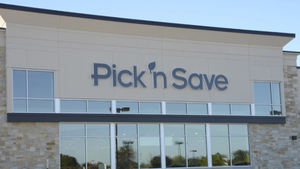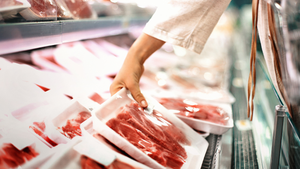PREPARED, NATURALLY
BOULDER, Colo. -- Natural-food supermarket chain Wild Oats Markets is making food service the main ingredient in a new scheme to become a tougher competitor against both supermarkets and restaurants.The 40-unit chain will impose major, expensive changes such as building more central kitchens, adding self-service to the mix and computerizing its food-service operations, all intended to set its prepared
December 2, 1996
ROSEANNE HARPER
BOULDER, Colo. -- Natural-food supermarket chain Wild Oats Markets is making food service the main ingredient in a new scheme to become a tougher competitor against both supermarkets and restaurants.
The 40-unit chain will impose major, expensive changes such as building more central kitchens, adding self-service to the mix and computerizing its food-service operations, all intended to set its prepared food apart from mainstream supermarket competition and win back some home-meal replacement dollars from restaurants, Wild Oats officials told SN.
The officials said they also expect Wild Oats' new emphasis on prepared food to reap bigger storewide profits.
It's a tall order for any prepared-food department. And Barry Perzow, the director of sales, merchandising and purchasing for Wild Oats, said the plan includes more changes, including:
Bringing the food-service department up front in all stores;
Creating additional theater with panini grills and saute stations;
Instituting a national buying program for prepared-food ingredients;
Using new technology to develop recipes and make use of scanning sales data;
Offering private-label prepacked entrees and side dishes not only in its own stores, but in other retailers' as well in an attempt to create national presence in the prepared-food business.
"The biggest change for us," Perzow said, "will be the addition of more centralized kitchens which will ensure quality and consistency."
The advent of centralized kitchens will allow the chain to dramatically reduce the proportion of prepared foods sourced from outside. Currently about 20% of the chain's prepared food is brought in. At most locations now, the remaining 80% is prepared in-store, a situation that Perzow said can sabotage chainwide consistency.
Within the next year, the company will add three central kitchens, bringing its total to seven facilities. Perzow said the benefits from centralizing food production are many, and include control over ingredients, techniques and procedures in production; heightened product quality and consistency; and the opportunity to do signature items.
The company's new strategy for prepared foods is bearing fruit so far in two stores, its newest Wild Oats unit in Fort Lauderdale, Fla., and an Alfalfa's unit here. The chain operates 30 stores under the Wild Oats banner, seven under the Alfalfa's name, and three units called Capers, in different markets across the United States.
The chain already expects a lot from its prepared-food operations. The home-meal replacement category, which for Wild Oats encompasses the bakery and the juice bar in addition to prepared food, currently contributes 20% to 30% of total store sales in some units, according to Jeff Paliwada, corporate director of food-service operations, which is a position newly created to help execute the new strategy.
"As far as focus goes, food service tops our priority list," Paliwada said. "The food-service department has been the stepchild in traditional supermarkets, and that's one reason we're putting it high up on the priority list. If the company didn't have a strong commitment to that department, I wouldn't have come here.
"We want to be the leader in prepared and value-added items. People keep talking about 'restaurant-quality' food, but we're aiming to offer above restaurant-quality food. That's the message I want resonating throughout the industry. We want restaurants and Albertson's to be scared of us."
Paliwada joined Wild Oats last month after leaving Whole Foods Market, the Austin, Texas-based chain that is Wild Oats' biggest competitor in the natural-food supermarket business.
He said he is a strong proponent of centralized preparation. "With more centralized kitchens, we'll have more control and consequently more confidence in our products. Even the upscale supermarkets outsource a lot of their prepared foods. And we have outsourced too much in the past. We want to bring that down to virtually nothing.
Currently the chain has central kitchens in New Mexico; southern California; Vancouver, British Columbia; and Salt Lake City. Chicago and Northern California are two sites to be added within the next year.
"Our goal is to have a central kitchen in every state in which we have at least three stores," Paliwada said.
At present, the chain has stores in California, Colorado, Florida, Kansas, Missouri, Nevada, New Mexico, Utah, and Vancouver. It's centralized production strategy will take it beyond internal distribution, Paliwada said. "In addition to supplying our stores, we plan to capture off-premises commercial sales. The products, with our label, will be sold to other retail stores. We've even had some interest from schools."
With such plans in mind, consistency is a must, he said. "Ingredients, procedures and techniques for making products will be uniform. We'll have clear, concise quality standards. There will be no secret recipes. When most production is at store level, consistency is almost impossible."
The advent of central production will allow Wild Oats to centrally prepack self-service items, which it has not done before.
"Offering the products prepacked as well as in the service case will give us additional sales. I believe in double exposure and triple exposure -- both chilled and hot in a service case, and prepacked for self-service. The more customers see a product, the more apt they are to buy it," Paliwada said.
New and remodeled stores will have at least eight to 10 feet of multideck case for prepacked prepared food, in addition to eight feet of service hot foods and eight feet of service chilled entrees and sides. In some stores, the prepacked display may reach 30 feet, he said.
The chain will increase its variety of entrees and sides by about 25%, and will put emphasis on categorizing and bundling prepared food to provide meal solutions, he added.
Wild Oats hopes the variety will pull in shoppers daily.
"They can't grocery shop every day. They might, however, come into our food-service department every day for a meal to take home. That's why we need a lot of variety. Our aim is to surround people with all kinds of options," Paliwada said.
Central kitchens will give the chain the opportunity to develop signature products and to increase variety, both of which are designed to bring customers in and keep them coming back, Paliwada said.
"We're highly committed to developing signature items," noted Paliwada, who said he had a background in catering where he learned "the tremendous importance of having signature products as a draw."
The chain will balance its centralized production with some preparation and finishing of products at the store level, to avoid robbing the stores of theater. But taking most of the production back from the store will help Wild Oats achieve another goal, that of turning the food-service department into a profit booster.
"We'll allow our prepared food to be the drawing card, but they've got to make money, too. Profitability is also high on my priority list," Paliwada said.
About the Author
You May Also Like




